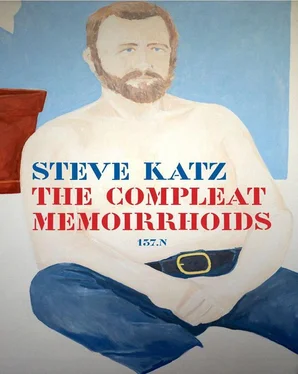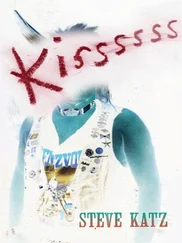We were both relieved to say goodbye at the airport. She returned to Jersey, myself worried that maybe I was too harsh in my view of her. Maybe too much curmudgeon. I had repressed a binful of anger. It is, after all, the job of a fifteen year old to piss off the adult. However, the texting addiction, the general addiction to those hand-held devices that are being sold up everybody’s ass these days, seems a pitiful poor substitute for real social interaction. I felt the lack of this capacity in this girl and I missed it on our trip. And I got no note, nor even an email of thanks for my time and expense. Others have told me that in ten years or so, when she realizes how rare are such kindnesses, and how tough life really is, she might look back on this and understand how she had blown an opportunity. Perhaps if I indulged in texting she might have texted me. A few months later at my sister’s funeral she approached me with the old line, “We have to stop meeting like this.”
In the beginning I weaseled through the streets, a copy of The Exagggerations of Peter Prince , just published, under my arm. If I met anyone I knew, or if anyone noticed me, I flashed my book, hoping for a “wow” or “cool” or “far out”. I was sweating in September, sick for recognition. The best part of one day I passed in and out of the Doubleday bookstore on Fifth Avenue and Fifty-seventh to keep an eye on my book, see if anyone buys it, see if it starts to fly off the shelf. During my whole vigil, not one browser even pulled it out to see what was there. Once I sneaked it face out, but a clerk noticed and turned it back because it blocked so many other titles. I must have smelled like a needy author. The clerks began to look at me sideways. I was grubby, unkempt, and bearded, like from way downtown. I hardly dared to say, “I wrote this book.” No one in the store would think I looked even approximately published by Holt, Rinehart and Winston. I figured I’d better leave before I was thrown out of the store or worse, cuffed and locked up with a copy of my book in my armpit.
In the evening I dropped into the 8th Street bookstore, important bookstore at the time because it stocked small press books and lit mags. Andrei Codrescu worked there. They hadn’t yet got copies of Peter Prince; in fact, a book of popular business sociology called The Peter Principle had come out at the same time, causing some confusion. Andrei promised to check it out, and that they’d order some copies. Later that evening I crossed from my apartment in the west village, on Morton Street, to Avenue A, where Ed Sanders had his amazing Peace Eye Bookstore. My wary youth in Washington Heights made me fearful of walking the streets in unfamiliar neighborhoods. Peace Eye was like a sanctuary for artists on the fringe. The store was open, and Ed Sanders was there. Mimeoed poetry and raw political mags were stacked on the tables for sale. All the back issues of Fuck You: A Magazine of the Arts filled one of the tables, along with The Fugs’ latest tape. He looked at my copy of The Exagggerations of Peter Prince with a mixture of confusion and contempt.
“What do you want to do, give me a copy of this for the store?”
I hadn’t thought about that. “Ummmh. Yeah.”
“Okay.” He took my copy and laid it on the windowsill. It looked way overdressed for this funky storefront.
“What else?” He wasn’t being friendly. We both had beards, though he was hairier. I didn’t know what to say to make friendship. Perhaps if my book had been mimeographed. I bought the latest issue of Fuck You and left.
I didn’t belong in Doubleday. 8th Street ignored me. I didn’t fit into Peace Eye. Not even a three page review in the Times Book Review , by R.V. Cassill, that totally trashed the book (though when I met him a year later he told me how much he liked my work), could cheer me up. It was a reason to sing the blues, if only I had the voice. The book came out in September. Holt had merged with a large media company, CBS, I think. Somehow my first book, a major production, with graphics and many other nifty accoutrements, a book like none other before or since, got shuffled out of the deck by the new barely literate corporate boardroom, and they didn’t even include it in their Christmas catalog. I felt totally orphaned. Holt, Rinehart and Winston had produced my first published book, and then erased it completely.
My family could afford to eat out only infrequently, and when we did it was almost always to eat “chinks.” We could afford the egg drop soup, shrimp fried rice, chicken chop suey at Wong’s Cantonese, next to the Loew’s 175th Street. This was the Washington Heights extravagant movie palace, comparable to the electric heavens of Loew’s Paradise in the Bronx, but with Oriental decor. It was later converted to a temple for Reverend Ike and his money evangelism. The building is still there but I don’t know what it does now. This dinner out was special, to honor some family accomplishment, like my sister Rita’s getting in to Hunter High School, or my mother’s passing her civil service exam. I was maybe six. That’s not far from just barely born, though a six year old feels like it’s been alive forever. The whole shebang started with me, it thinks.
This is supposed to be a treat, Gaffney’s on 181st between Broadway and Wadsworth, near the RKO Coliseum, another, smaller movie palace. This joint has tablecloths and cloth napkins. They serve steak, lobster, prime rib. The inside is clean and well lit, lacy curtains on the windows, real flowers in bud vases on the tables. I don’t remember other customers. Someone drops a basket of bread and breadsticks on the table. My sister and I immediately dive in. “Don’t fill up on bread,” my mother warns. “You won’t have any appetite for food.” My mother consults with me about what I want from the children’s selections. Rita is fourteen and gets to choose from the regular menu. I pout and whine. My father says, “Let him have whatever he wants. Let him have a steak.” “It’s too much, too heavy,” my mother says. “He’s a child.” “He’s a little man,” says my dad.
We settle on what we want, and lay the menus down. My parents look to the waiter who leans against the wall near the door to the kitchen. My father waves a menu and waits. The waiter doesn’t budge. “You’ve got some customers here,” he sings out. “Ready to order.”
“To hell with the customers,” the waiter shouts.
My mom and dad look at each other. I’ve never seen them confused before. “We’re customers here,” my father reiterates. “How do we get to eat at this restaurant?” my mom chimes in.
“To hell with the customers. To hell with the restaurant.”
My father rises half out of his chair. His face is red. He has a heart condition. Mom settles him back with a hand on his shoulder. “Can I speak to the manager,” my dad asks.
“To hell with the manager,” the waiter disappears through the kitchen door.
After waiting just a little longer my mom gathers us up and we leave the premises. My parents are indignant. My sister and I are gleeful. We have witnessed something really strange in the ineluctable world of grownups. Rita winks at me.
“He was drunk. He’s just a drunk,” my dad says as we walk home to heat up the left-over pot roast. It is delicious, always better the second day.
The first time as a reader I enter “Bartleby, the Scrivener,” the immense and enigmatic novella by Herman Melville, Bartleby feels totally familiar. This is human. It is political. It is an employee/slave constant. Perpetual, like a scientific constant. “To hell with the customers,” is what I hear with those six year old ears, whenever Bartleby pronounces in response to a demand that he do some work for the man, “I would prefer not to.”
Читать дальше












